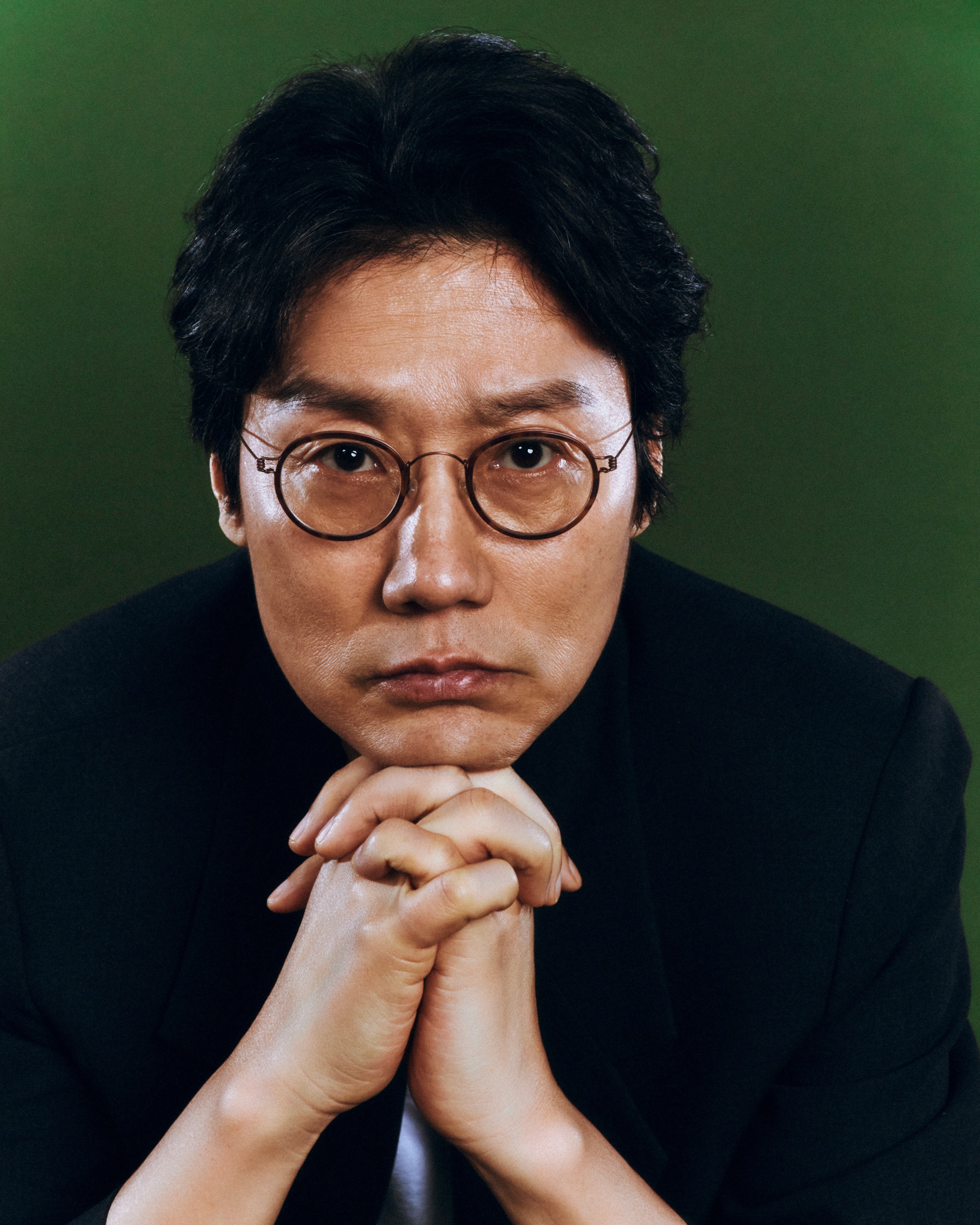
"At first, I instinctively thought of a happy ending."
Netflix's Squid Game (directed by Hwang Dong-hyuk) has come to a close with its third and final season. Seasons 2 and 3 reflected an even harsher reality, with an ending that delivered not hope, but devastating sacrifice.
The polarizing finale sparked intense debate. Originally, the storyline had Gi-hun dismantling the game. But Hwang reconsidered what message the series truly needed to convey.
"When I was working on Season 1, the world felt dire. But now, things are worse. Life for ordinary people has become more difficult, war is spreading, the climate crisis is deepening, and it seems like no one even has the will to fix anything... I felt I had to talk about that."
Viewers may be split, but Hwang said his aim was to reflect reality as it is—because the drama's events mirror the state of the world we live in. Here's more from our interview.

Q. What does the ending mean?
Director Hwang Dong-hyuk spent six full years on Squid Game, beginning in 2019. The series became a global phenomenon, with Season 2 ranking as the most-watched show in the U.S. for the 2024–2025 cycle.
"I don't think I'll ever receive this level of attention again. It's the first time I poured so much of myself into a project. Now that it's over, I feel a little sad, but also relieved."
Seasons 2 and 3 were conceptualized as one continuous story. All eyes were on how the saga would end.
"At first, I did consider a happy ending," Hwang admitted. "But Gi-hun's sacrifice felt like the right conclusion for this journey."
"Someone has to give something up—someone has to sacrifice—for there to be an answer about the future. But no one seems willing. I felt Gi-hun symbolized that kind of sacrifice."
There was hope that Gi-hun might be able to stop the game—especially with characters like Hwang Jun-ho (Wi Ha-jun) and the Pink Soldier No-eul (Park Gyu-young), who represented a sliver of conscience. But the ending took another route.
"I understand that some people were disappointed," he said. "Some came for the games, some for the social message—expectations differ. Because Season 3 brought all that attention to one point, reactions were bound to become more intense."

Q. Why introduce a killing game?
One of Squid Game's trademarks is its twisted use of nostalgic childhood games. Season 1 featured "Red Light, Green Light," dalgona candy, tug-of-war, marbles, and the glass bridge.
"We considered games like 'Why Did You Come to My House?' but the gameplay devolved into endless rock-paper-scissors. It didn't work dramatically," Hwang said.
"'Open the Dongdaemun Gate' was also rejected because the outcome was based too much on chance."
That left games like jump rope, hide-and-seek, and the elevated squid game. Hide-and-seek, in particular, stood out—it gave participants actual knives, allowing them to kill each other.
"Each season's fourth game was key. In Season 1, marbles decided the fate of major characters. This time, I wanted that to be hide-and-seek."
"Yes, it worried me—letting players kill each other might break the rules of the game. But for the sake of drama, I decided to include it."

Q. Why was Gi-hun's rage aimed at Dae-ho?
Gi-hun started out as an ordinary, bumbling man, buried in debt. Even after surviving the game, he couldn't shake off his trauma. From Season 2 onward, he moves with a sense of mission to end the game.
He even attempts a rebellion, but it fails when Dae-ho (Kang Ha-neul) fails to bring bullets. Gi-hun explodes in rage at Dae-ho.
However, some viewers found it hard to empathize with his anger. After all, Gi-hun had initiated the rebellion, and Dae-ho was frozen by trauma.
"Gi-hun isn't a hero," Hwang explained. "I wanted to portray the weakness of an ordinary man."
"He might've entered like a hero, but he didn't become one. He projected his crushing guilt onto Dae-ho. I wanted to show a very human reaction. When Dae-ho dies, Gi-hun realizes that his anger was just another form of self-blame."
"I wanted to show that even someone foolish and flawed could stand up again—and ultimately sacrifice himself for the baby. Gi-hun is a symbol of normalcy. This wasn't a story that could produce a 'hero.'"

Q. Why was the baby necessary?
Director Hwang described the baby as the symbolic core of Season 3.
The child is born in the game arena, becomes a contestant in place of her mother Jun-hee (Jo Yu-ri), and represents the question: What kind of world are we leaving to the next generation?
"The baby is symbolic. A sign of the future. Some might say the birth was too sudden, or question how a baby could survive in that world—but I hope people understand it as symbolism."
"Younger generations believe they'll never live better than those before them. How can a world with no hope go on?"
"We have to pass down a world that's at least 'not worse' than what we've inherited. Through the baby, the conflict surrounding her, the effort to protect her, and Gi-hun's sacrifice—I wanted to show exactly that."
"In the end, Front Man (Lee Byung-hun) holds the baby and looks at Gi-hun's body. That scene was the emotional resolution.
He acknowledged that Gi-hun had won. That's why he destroyed the game and saved the child."

Q. What if Myung-gi and the baby were the only ones left?
The emotional climax of Season 3 was Im Si-wan's performance as Myung-gi.
In the final game, he believes he can survive if he simply escorts the "lunchbox" (the next person to die). But when the lunchbox character commits suicide, everything changes.
Only Gi-hun, the baby, and Myung-gi remain. Myung-gi tries to cross over first to take custody of the child—but if the baby comes to him, he'll be forced to kill her.
He falls into an emotional spiral. In desperation, he even begins to convince himself that the child may not be his—just to justify what's about to happen.
"I got chills watching Im Si-wan's performance," Hwang said.
"Some people wonder: if Gi-hun had handed over the baby, would Myung-gi have killed her? Or himself? No one knows."
"If you look at Myung-gi's face when he tries to throw the baby… you can't quite tell if he would've done it or not. He portrayed that emotional turmoil so well.
If you want an answer, go ask Si-wan himself. Haha."

Q. Was Jun-ho just… a fisherman?
From Season 2, the series expands outside the island. Jun-ho spends years at sea searching for his brother In-ho. But his lack of presence disappointed some viewers—leading to jokes that he was filming The Fisherman Show instead.
"Jun-ho was originally a MacGuffin," Hwang said.
"In early drafts, Jun-ho and a squad of mercenaries would discover the island, team up with Gi-hun, and escape. But with how the ending evolved, that scenario no longer fit."
"Still, I wanted him to make it to the island. In-ho later entrusts the baby to Jun-ho, so I wanted him to witness that moment."
Why entrust the baby to Jun-ho?
"He's the only person who truly understands that world. Even if you gave him ₩45.6 billion, he wouldn't waste it. From In-ho's perspective, Jun-ho was the most trustworthy person."

Q. "Humans are…"
"Humans are…"—those were Gi-hun's final words.
Despite the horrors he endured, he held on to his belief in humanity and ultimately gave his life to protect it. Hwang left that sentence unfinished, open-ended.
"The more I thought about it, the less certain I became," he said. "Humans can't be defined in one sentence. They're selfish and greedy… but they're also capable of giving everything to help others. No other species can do that."
"I didn't want to say what people should be. I wanted to show it—through Gi-hun's actions. His sacrifice was the answer."
"We're sinking as a society. Someone has to sacrifice themselves to stop the descent—and leave a better world for the next generation. That's what I wanted to say. That's why I left it blank."



